Perugia: Italy’s chocolate capital a sweet spot to celebrate the dying profession of journalism
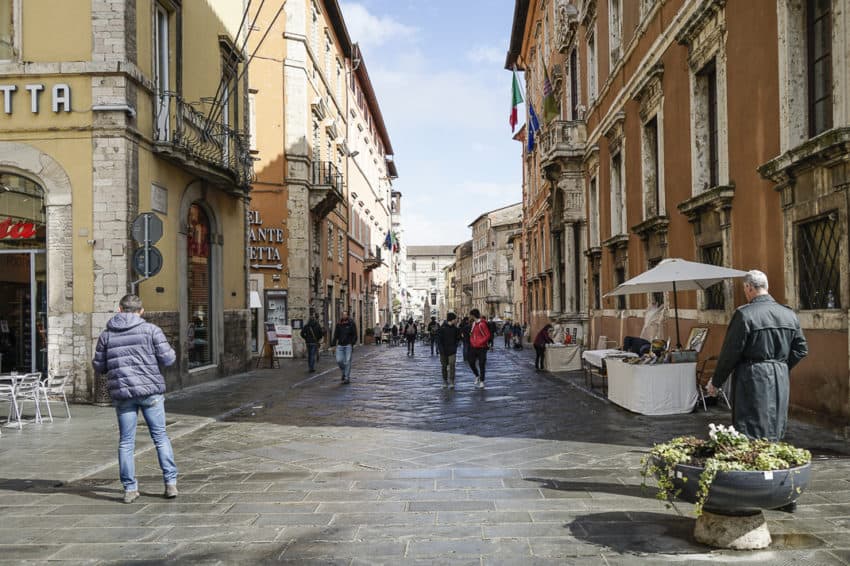
PERUGIA, Italy — If Italy was a gelato cone, Perugia would be the hot chocolate syrup they dip it in.
It’s the chocolate capital of Italy. It’s home to Perugina chocolate (Baci chocolate kisses, anyone?), the annual Eurochocolate festival and more chocolate shops than Dublin has pubs. Thus, my heart — and my dentist — have huge sweet spots for this hill town in the heart of Umbria.
It’s not just chocolate that brought me here recently. The International Journalism Festival had five days of lectures and conferences, including the intriguing and newsworthy American topic, “Beyond Fake News: What’s Next for Tackling Online Misinformation.” Perugia is the capital of Umbria, pushing Sicily as my favorite region in Italy, with fantastic local cuisine and wine and an unspoiled persona. As the only one of Italy’s 20 regions not bordering an ocean or another country, Umbria has been the least vulnerable to outside influences.
Oh, I also won an award.

The Camera di Commercio Perugia takes such great pride in its town and region it bestows awards to journalists shedding light on a place oft overlooked on tourists’ well-trodden pilgrimages across Italy. I won the Umbria del Gusto (Flavor of Umbria) award for the January blog I did about American transplant Ev Thomas buying an 800-year-old farmhouse in Umbria and turning the few grape vines into a fledgling winery. The Local, Italy’s only English-language news source, picked it up and while it didn’t go viral, it did go Umbrian.
The town put up my girlfriend and me for two nights in the four-star Sangallo Palace Hotel, wined and dined us and feted us like the celebrities that we aren’t.
No, Umbria del Gusto isn’t the Pulitzer. But it’s in Perugia, and that’s award enough. Plus, it’s always fun trying to explain what “Dog-Eared Passport” means in Italian.
Perugia (pop. 165,000), 100 miles north of Rome, always gives me the early impression that I’m walking onto a science fiction set. To reach the centro storico (historical center) from the hotel, you must walk up through a complex of dark, eerily lit tunnels, lined with huge, high-ceilinged rooms used for everything from a souvenir shop to conferences. I remember sitting blindfolded in one of them during Eurochocolate 2008 and having a blind chocolate taste — run by blind people.

The area is called the Rocca Paolina and built by Pope Paolo III Farnese in the 1540s as a fortress over a very wealthy neighborhood. In 1983 the city conveniently outfitted it with escalators, making the steep climb into darkness a lot less taxing. Nevertheless, I still always feel like I’m in a subterranean, prehistoric cave waiting for a T-Rex to step around the corner.
Escaping from the tunnels you come across a compact centro storico that is tranquil until the hordes of university students hit the piazzas and bars at night. The town is home to the University of Perugia, founded in 1308, with 35,000 students and the University of Foreigners with 5,000 foreign students, most of whom are abroad with mommy and daddy’s money for the first time. It was this atmosphere that Perugia received its most fame in recent years.
Amanda Knox, a Seattle native studying in Perugia, was arrested and convicted of murder in 2009 when a roommate had her throat cut during what many have termed a group sex game that went bad two years previously. The attractive Knox became a media sensation. “Foxy Knoxy” spent nearly four years in jail and was eventually exonerated after evidence emerged of the police’s colossal series of screwups.
On one past trip through Umbria, some friends and I stopped by the roommates’ old house on the downslope of the hill. The long, two-story home has become as big a tourist attraction as San Lorenzo, Perugia’s 1,100-year-old cathedral. After many conversations with locals, who don’t seem to mind the persistent question, I’m firmly convinced the only people who think she’s innocent are in the city of Seattle.
Speaking of Seattle, Perugia felt like it all weekend. It poured nearly the entire time. I emerged from the tunnels to a tempest making the cobblestone streets empty and slick. I walked past the Perugina outlet store and to Palazzo dei Priori, the 13th century palace that looks more like a small castle than the city’s main art gallery. I managed to find a staircase that wound down into a dark alley to a small sign reading “LA TAVERNA.”

This hidden, elegant diner is THE place to try Umbrian cuisine. This region is known for four main foods: cinghiale, wild boar that so over runs Central Italy even animal lovers don’t protest its hunting season; tartufi, black truffles that are considered a delicacy all over Europe and without question the most overrated food in Italy; lenticchie, lentils made into a thick soup terrific in winter; piccione, pigeons, cooked whole and once the diet staple of locals while under attack in the Middle Ages.
While I waited for Marina to get off work and take the train up, I took a seat alone at a table with a white tablecloth and looked up at the vaulted brick ceiling. Eating inside what seems like a cave has its own romance, especially when Umbrian food is added. My pappardelle with Umbrian ragu (long, flat noodles with wild boar meat sauce) was thick, fresh and fantastic. Topped off with a glass of Umbria’s Morcinaia wine, a blend of Cabernet Sauvignon, Sangiovese and Merlot, it was a great bargain for only 23 euros.
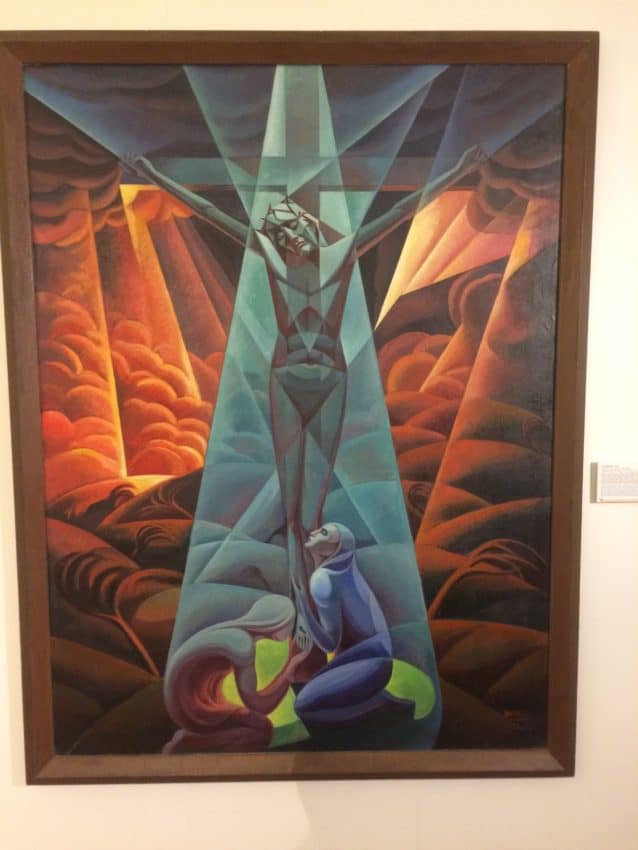

The award ceremony was a two-day affair beginning with an evening guided tour of the Museo Civico di Palazzo della Penna which hosted weird, haunting works of Gerardo Dottori, a Perugia artist famous for his futuristic works from the early 20th century. Later, the other seven award winners and I joined the organizing committee and judges for an aperitivo of local meats and cheeses followed by an Umbrian feast. Besides my tender manzo, I had a dish called sfornato, kind of a local polenta but much thicker and tastier than the bland polenta I’ve had in the past.
I sat next to one of the judges who read my work. Dennis Redmont is a retired former Associated Press bureau chief in Rome. Amazingly, we had met before. In 2003, nearing the end of my first 16-month stint in Rome and deeply in the throes of love with my adopted city, I went to him hat in hand opening I could land a part-time job and extend my stay. He sat down with me and said that AP was in the process of shedding about 15-20 percent of its workforce around the world. It was foreshadowing of what was to become in my news industry.
Since I returned to my old job at The Denver Post in 2003 to today, The Post’s newsroom has gone from more than 350 reporters to 60. The staff is so small the paper moved from its cool downtown location to the suburbs where it shares space — with its printing plant.
Yes, I did get out at the right time.
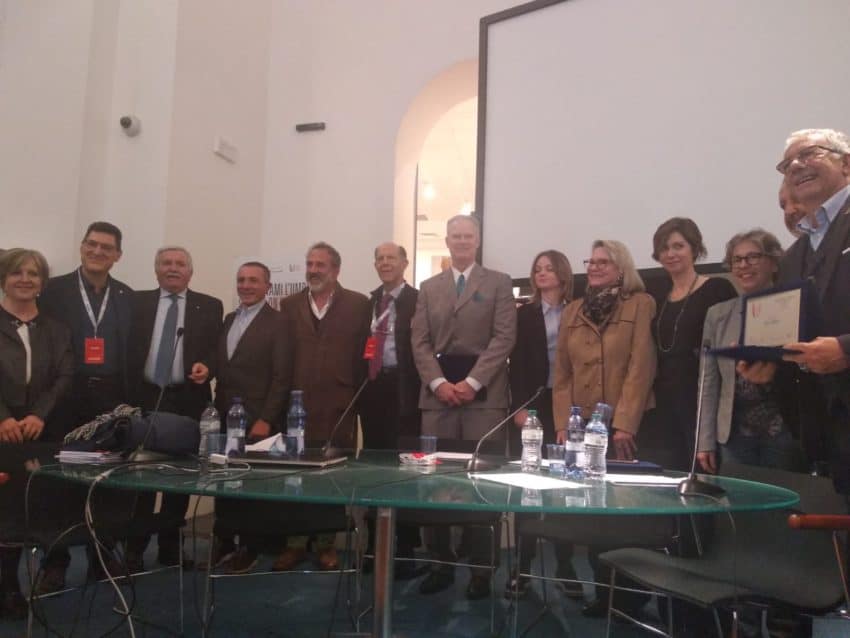
But events like Perugia makes me glad I keep a hand in it. I dressed up in my toned-down gray Italian suit. Marina talked me out of one of the shiny silk suits that make me look like a flunky for the Irish mob. Before the ceremony at Centro Servizi G. Alezzi conference center, we escaped the rain across the street at Caffe Perugina. It’s one of Perugia’s beautiful bars (cafes are often called “bars” in Italy), with ornate furnishings and brass tabletops. Over a cappuccino, it felt like we stepped into Perugia in 1920s. I was taken aback when the barista said Caffe Perugina began in 1997.
During my career, I was never big into awards, mainly because I didn’t win many. I was more of a grinder journalist, a sportswriter who plugged along day after day, seeking news and sprinkling my coverage with the occasional long human interest story. When I branched out into food and wine, things changed. You don’t really break food news. What, “TOMATOES SEEKING MORE RESPECT IN SUPERMARKETS”?
Instead, I wrote the weird (I tried eating a 72-ounce steak in Amarillo, Texas), the trendy (restaurant boom in Moscow) and the disgusting (animal penis restaurant in Beijing). I always tied it to the local culture. This was the second award I’ve won for food and wine writing. Maybe I missed my calling.
The conference room was packed with observers and photographers. I sat in the front row with the other winners, all of whom walked up to the dais for a question and answer period. Notified shortly beforehand that the session would be in Italian, I nearly fled the room. I can answer any question in Italian; the problem is I likely won’t understand the question in Italian.
I told Redmont my dilemma, who said he would do the Q&A in English and translate.
“It’ll be more exotic,” he said.
Most of the awards were for videos, showing Perugia at its majestic best, catching sunrises from the hilltown and the monuments glistening in the city’s soft lights at night. Two guys traveled around Umbria talking and capturing video of the region’s underrated wineries.
I felt so old school. It was merely a blog. How boring. But Redmont asked me about the theme of Dog-Eared Passport and a recent blog I wrote about my three travel stories from hell. I talked too long and talked too fast and hardly anyone understood. I had to wait for Redmont’s translation to hear any laughter about my bout with typhoid in Northern Thailand.
Later, we all gathered for group photos, standing in front of a phalanx of photographers as if we were standing on a red carpet instead of a concrete floor.
Afterward, Marina and I dashed back to the hotel to change clothes more appropriate for early flooding stages and waded back into Centro Storico. The journalism festival had 275 different conferences. We had time to choose one. Appalled by Pres. Trump’s attack at the free press and labeling every critical sentence “fake news” drew me to the lecture “Beyond Fake News.” James Ball is an English journalist and author of “Post-Truth: How Bullshit Conquered the World.” He was part of a London School of Economics commission that did a report on misinformation.
I met him outside the Arcivescovado conference room, sharing the same piazza as Palazzo dei Priori. Late 30ish and casually dressed, he talked to me about how news coming out of Brexit is getting as scrutinized as much as it is out of Washington. Ball is a level-headed, highly intelligent journalist with a quick British wit and an analytical bent.
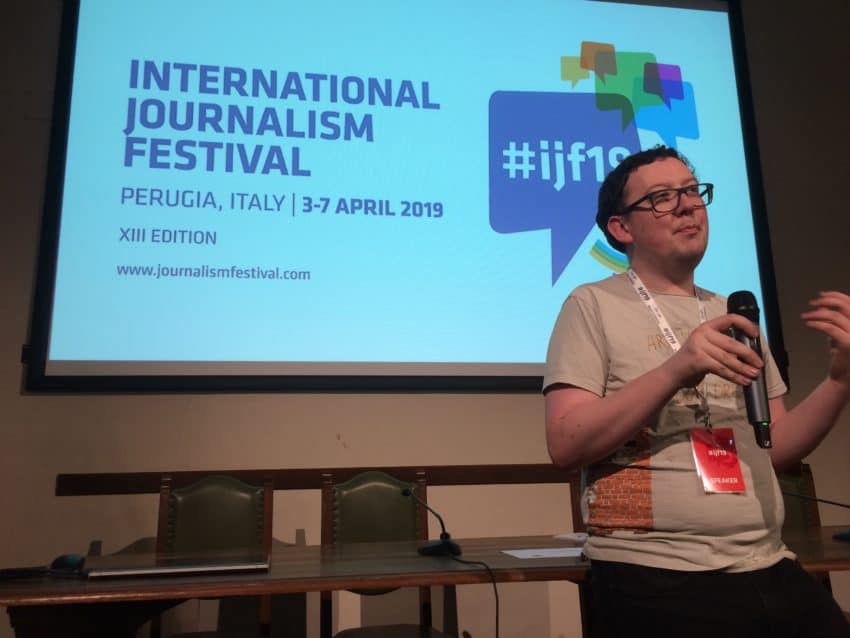
One point was fake news involves more than Donald Trump. Before Trump started defecating on the First Amendment, journalists wrote wildly hilarious headlines just to get the reader “clicks,” the new media measurement for economic success. He mentioned some headlines from that day:
“BIBLE SHOCK! WHY EXPERT CLAIMS JESUS RESURRECTED THROUGH ADAM’S BODY AFTER CHURCH FIND!”
“NH370 SHOCK! DATA FROM MISSING MALAYSIAN AIRLINES FLIGHT SHRUGGED OFF AND IGNORED!”
“TIME TRAVEL SHOCK! TIME TRAVEL FROM 2018 SHOWS PHOTO OF DINOSAUR FROM THE PAST!”
He said they were all from that day’s edition of The Sun, the United Kingdom’s top-selling newspaper.
“So if fake news is this terrible threat to journalism then why is our biggest paper putting it out? If fake news isn’t the problem, what is? … What we have is a bullshit problem and a misinformation problem and that’s a lot harder than fake news.”
He brought up the story in Breitbart, American journalism’s equivalent of “Mein Kampf.” It wrote that a Muslim mob set fire to Germany’s oldest church. What actually happened was a protest march of recent Muslim immigrants seeking asylum. There were some fireworks and one hit a tarpaulin on a boundary wall of the church grounds. It started a small fire and the protesters helped put it out.
“There was a fire. There was a church and it was a majority Muslim crowd,” Ball said. “Is it fake news to turn it into what Breitbart did?”
And it’s not just the rags that are guilty of this, Ball said. Take Russia’s meddling into the 2016 election.
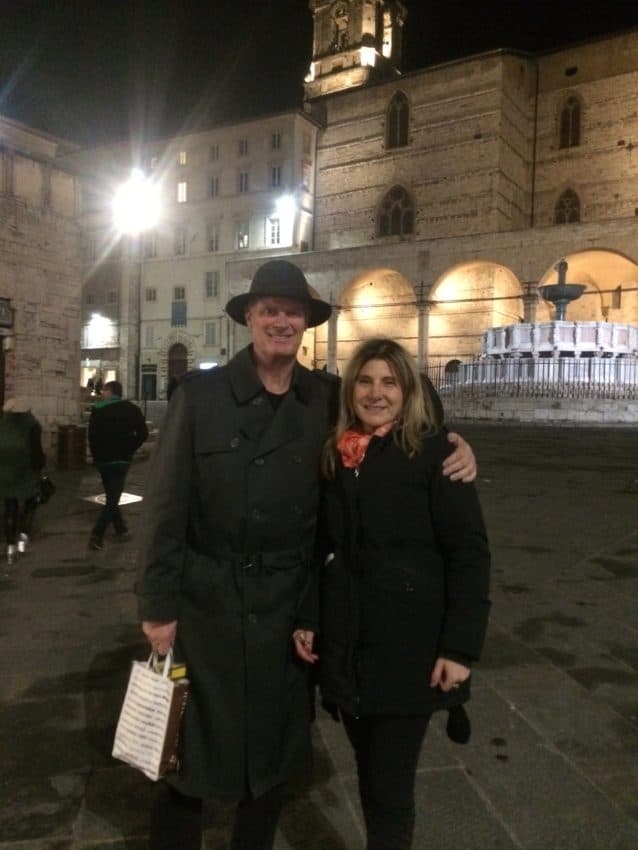
“They put those emails by Wikileaks but that’s not where the public saw them,” Ball said. “They saw them through Fox News, through CNN, through The New York Times, The Washington Post. We don’t self search. We shout at Facebook. We shout at Twitter. We shout at the public. We shout at Russia. We ignore the fact that we’re the agents for all this.
“We’re not good at not being played.”


April 15, 2019 @ 1:03 pm
Your Trump Derangement Syndrome is really quite off-putting – very offensive to what one would presume is half your potential American market. Incredibly stupid business move. Worse, though, is your poor grasp/inconsistent use of English grammar. “The city took my girlfriend and I…”
Seriously? Where to begin with that sentence? If you’re going to claim to be a journalist, even a former journalist, please learn when to use “I” and “me” and, for that matter, when to use “brought” as opposed to “took”.
August 30, 2020 @ 9:42 pm
Why must everything you write have to somehow include criticism of America? Please, just tell us wonderful, informative stories about Italy. We don’t want or need some constant political diatribe. Be neutral or I’m done reading anything you write.